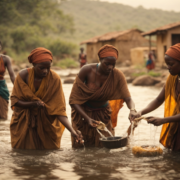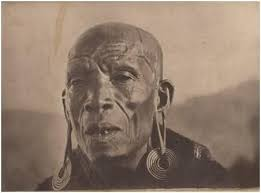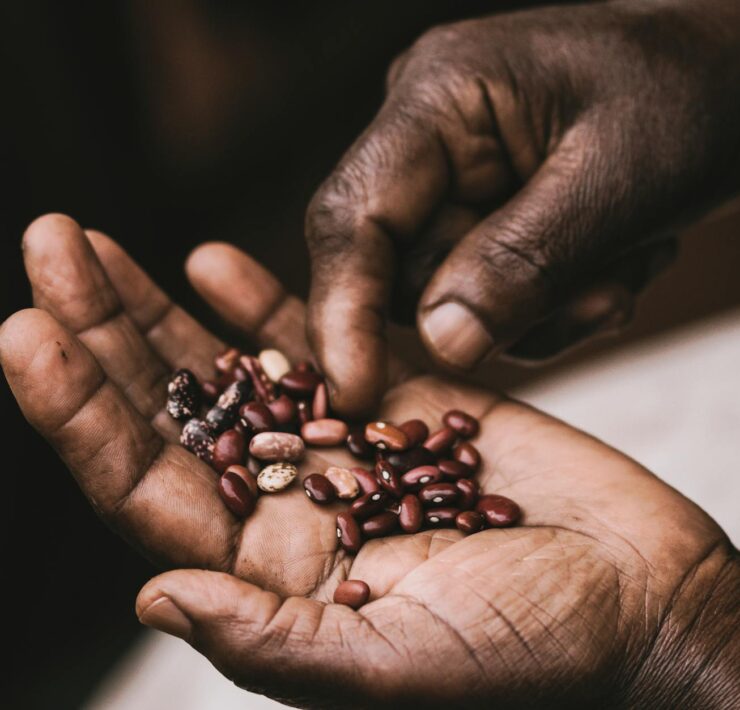Deimperialisation of the Colonial Economy

Dr. Bhengu is an Independent Researcher on Afrikan philosophy, Afrikology…
Originally posted 20th February 2014 on jbhengu.wordpress.com
Published in loving memory of Dr Mfuniselwa J. Bhengu
Introduction
Africa is in a crisis. It is a crisis of cultures. It is a crisis fueled by the struggle between indigenous Africa and the forces of Western civilization. The whole process of attempted modernization is a form of ‘unnatural dis-Africanization’, which is effectively dislocating and tearing Africa away from its indigenous roots. The question we need to ask ourselves is: Can economic progress take place without a massive shift in societal values?
This is the question that South African political Parties need to ask themselves before they make false political promises, embedded in their political manifestos, to the poverty-stricken people, and make them voter fodder for their political hegemony.
A new economic knowledge paradigm for the future needs to emerge, which would aim to reach out to the excluded and to address the need to deal with the root-cause of economic development failure in Africa. As a knowledge paradigm for the future, it must be, inclusively, take on board the experiences of the excluded. Hence there must be an understanding of the indigenous knowledge systems of the excluded, for that would increase the chances of adapting international practices to the local setting and can help improve the impact, and sustainability, of development.
The Cold War as a Context
Historically the Cold War provided Africans with two ideological options: the capitalist path or socialist path within an un-decolonized modernist-imperial world order. Africans tried to navigate this binary through such initiatives as the Bandung Conference of 1955 that emphasized decolonization as a central choice for the Global South; the Non-Aligned Movement; the push for a New International Economic Order; the Lagos Plan of Action; Africa’s Priority Programme for Economic Recovery; the African Alternative Framework to Structural Adjustment Programme for Socio-Economic Recovery and Transformation’ the African Charter for Popular Participation for Development; right up to the New Partnership[ for African Development.
These initiatives constituted what Ali Mazrui referred to as African solutions to African problems (Pax Africana). The intellectual resource for these initiatives was the dependency theory and the active agent was the United Nations Economic Commission for Africa (UNECA) under the leadership of Adebayo Adedeji.
These initiatives failed because they were ‘opposed, undermined and jettisoned by the Bretton Woods institutions and Africans were thus impeded from exercising the basic and fundamental right to make decisions about the future’. Adedeji identified what he called ‘the operation of the development merchant system (DMS) under which foreign-crafted economic reform policies have been turned into a kind of special goods which are largely and quickly financed by the operators of DMS, regardless of the negative impact of such policies on the African economies and polities’. What emerges clearly here is that what Adedeji describes as DMS carry coloniality which actively works to deny agency to Africans to chart an autonomous path of development (Adedeji, 2002).
The Western powers’ economic grip on Africa was intensified in the 1970s as they underwent prolonged recession. The Washington Consensus emerged as a Western initiative of managing the economic recession. Western welfarism informed by Keynesianism was replaced by neoliberal principles that privileged market forces in the struggle against inflation.
The Western Consensus
The Washington Consensus was constituted by a set of ideas and institutional practices that began to dominate the world economy from the 1970s onwards. The world order brought about by the Washington Consensus became known as neoliberalism.
Coloniality remains a reality. Decolonization remains a future that Africa must fight for, as it deals with cultural, psychological and epistemological aberrations. Without these processes taking place, the possibility of African people exercising extra-structural agency remains ‘pie in the sky’.
In order to regenerate a true African economic renaissance, we need to consider doing things differently, making the impossible possible, and produce economic transformations that would include the excluded. This inclusive approach should not be at a material level only but also at a spiritual level.
An Inclusive Paradigm
An inclusive paradigm can fulfill people’s purpose in life if it has the ability to harmonise the two cultural modes (i.e. the dominant economic paradigm and the alternative economic paradigm). This means we must begin by looking at our diverse historical and cultural epistemologies, and then develop an economic cultural synergy.
What is important is to pursue knowledge production that can renovate African cultural economy, defend the African peoples economic dignity and civilisational achievements and contribute afresh to a new economic global agenda that can push us out of the crisis of modernity as promoted by the European Enlightenment. Such knowledge must be relevant to the current needs of the masses, which they can use to bring about a social transformation out of their present plight.
The first thing to be observed is that the epistemological field traversed by the human sciences was not laid down in advance: no philosophy, no political or moral option, no empirical science of any kind, no observation of the human body, no analysis of sensation, imagination, or the passions, had ever encountered, in the seventeenth or eighteenth century, anything like man. They appeared when man constituted himself in Western culture as both that which must be conceived of and that which is to be known.
The historical emergence of each one of the human sciences was occasioned by a problem, a requirement, an obstacle of a theoretical or practical order: the new norms imposed by industrial society upon individuals where certainly necessary before psychology, slowly, in the course of the nineteenth contort, could constitute itself as a science; and the threats that, since the French Revolution, have weighed so heavily on the social balances, and even on the equilibrium established by the bourgeoisie, were no doubt also necessary before a reflection of the sociological type could appear. But though these differences may well explain why it was in fact in such and such a determined set of circumstances and in answer to such and such a precise question that these sciences were articulated, nevertheless, their intrinsic possibility, the simple fact that man, whether in isolation or as a group, and for the first time since human beings have existed and have lived together in societies, should have become the object of science – that cannot be considered or treated as a phenomenon of opinion.
We cannot, therefore, talk about the production of ‘knowledge for its own sake’ without interrogating its purpose. There cannot be such a thing as the advancement of science for its own sake. Those who pursue ‘science for its own sake’ find that their knowledge is used for purposes, which they may never have intended it for. Eurocentric knowledge is not produced just for its own sake. Its purpose throughout the ages has been to enable them to ‘know the natives’ in order to take control of their territories, including human and material resources for their benefit. Such control of knowledge was used to exploit the non-European peoples, colonize them both mentally and geo-strategically, as well as subordinate the rest of the Third World to their economic designs and interests, at the expense of African culture.
What is critically important for realization is that Africa and its peoples have been subjected to a process of economic disorganization, economic fragmentation and economic disintegration of their historical-cultural and civilizational achievements. These achievements, in many cases, have been appropriated by other peoples and turned around on their heads against the African people. In the process, the African civilization, including African indigenous economic relations, has been raped; plundered, despoiled and dehistorized.
The process of economic re-awakening and economic recovery has to be one of a historical deconstruction, consciousness raising and restatement not in the way the post-modernists and post-structuralists have argued, but by Africans tracing the origins and achievements of their civilizations with a view to developing new economic epistemologies of knowledge production based on African lived experiences in their global implications.
The process must delve into African economic, historical and cultural experiences throughout African history.
It is, therefore, about the reconstruction of our understanding of ourselves as Africans and how our relationships with the rest of humanity has led us where we are in the context of a global economic historical process. It is a hermeneutical problem of self-understanding in which we have to position ourselves as authentic human beings who have made a contribution to human civilization, and justifiably so since Africa is the Homeland of the World Cradle of Humankind. In a word, it is a hermeneutic task in which we have to foreground ourselves in the context of reconstructing our economic historical consciousness.
It is wrong to copy ‘systems’ or ‘disciplines’ developed elsewhere, while at the same time talking about the need for ‘renewal’ and ‘rebirth,’.
The aim, therefore, is to create an African self-understanding, in economic terms, which is necessary if Africa is to emerge as a proud member of the economic global society to which it belongs. It is my argument that this can be achieved if we infuse the Eurocentric market economy with African metaphysics, so as to bring about a situation in which her achievements are recognized and for these achievements to be seen as the building blocks of the human heritage.
We need to make a new skin, develop a new thinking, try to put afoot a new human being. What is called here for is not a cultural-historical egoism, but an other-directed openness, not an already established interpretation of nature, history, world and the ground of the world. It is an open-ended project of a humanity that finds itself engaged in joint struggles. All colonized people – all people in whose spirit is born of an inferiority complex, by the burial of a local cultural originality – find themselves face to face with the language of the civilizing nation, that is the metropolitan culture.
We are at a point in time when the dominance of the universe of European singularity is being encompassed or engulfed by the multiverse of our shared humanity. The central concern for the practice of philosophy focused on the formerly colonized world should be directed at helping to create a situation in which the enduring residue of our colonial part is systematically overcome.
We are, at a formal level, beyond the constricting confines of colonialism, and yet every aspect of existence in the formerly colonized world, and in Africa specifically, is still, in essential and fundamental ways, determined and controlled by our former colonizers. This is not to allocate blame but to locate specifically the source of our present predicament, not only as it pertains to our economic and political dependence on the West, but also as it pertains to our dependence and subordinate position in the realm of thinking and in questions of knowledge.
The interiorized hegemony of the West – our enduring ‘faith’ in the ‘shadow’ of the dead colonial God – finds its ‘objective’ correlate in the historical integration and subordination of our systems of knowledge to the world system of knowledge and know-how, just as underdevelopment as a whole results, primarily, not from any original backwardness, but from the integration of our subsistence economies into the world capitalist market.
Recently there has been a call for an ‘Economic Codesa’ to, among other things, to unpack the theory that says we live in a country with two economies, that is, the first economy and the second economy, wherein we may liken ‘our socio-economic situation to a double-decker bus in which the prosperous members of the multiracial middle-class were riding in comfort on the upper deck, while the almost wholly black unskilled, unemployed have-nots were crowded uncomfortably in the lower deck’. The question is: How do we build that stairway between the two decks? That is the minor challenge facing the mooted Economic Codesa, if at all it will ever take place. The biggest major challenge is how do we embed European-oriented economy in the African lived experiences?.
The knowledge paradigm of the future is beginning to develop by reaching out to those excluded. It is a compassionate but strategic evolution through contemplation during which the outer voice of possibility meets the inner voice of disenfranchisement. Significant and intimate connections are then made between the pain and the creative impulses essential for the transcendence, which then become the very touchstones of healing and creativity. We need to deal with the root-cause of economic development failure in South Africa and in Africa as a whole.
Cultural Element
Modern neoclassical economics tends to downplay the importance of culture to economic development, yet there is a cultural dimension to economic behavior. Economists make the simplifying assumption that human beings are rational utility-maximizing individuals, and that such maximizing behavior is largely invariant across different human societies. Gradually, because of the advance of western European technology, everything came to be controlled more and more by the European side. There is a convincing argument in our rich literature that there is a different economic anthropological argument that denies the universality of Western capitalism. Economic relations of Western capitalism are relative to Western civilization only. Individual in an African society was not threatened by starvation unless the community as a whole was in like predicament. Among Africans ‘whoever needs assistance receives it unquestioningly’. In other words, in African economic relations, a concern for human well-being takes precedence over the profit motive.
The question of failure to reconcile the indigenous African economic relations and practice, which is embodied and underpinned by an African humanism, with European market economy (capitalism), which is embodied in, and underpinned by, the culture of European economism, has always attracted the attention of scholars and policymakers.
Development of a New Economics
The challenge is to develop a new economics, which shall be a reflection of the economic experiences of the overwhelming majority of society, a very large proportion of which lives in rural and semi-rural areas. Our economics must begin with an accurate knowledge of the situation and needs of the overwhelming majority of Africans in rural and semi-rural areas, and in the shacks and townships of our urban areas. Our economics must be inclusive and relevant to everybody’s local ecology and experiences. In short, our economics needs to be deimperialised. At the same time we need to have a look at both negative and positive sides of capitalism.
While capitalism is widely criticised, and correctly so, but there are some advantages of capitalism, as follows:
1. Capitalism is an internally stable economic system, in that it is consistent with human behavior. You have to work to survive, and only the lucky who manage to thrive within the socio-economic matrix make it to the top.
2. Capitalism is externally stable, in that survival in a capitalistic system requires innovation and flexibility to keep up with the changes in supply and demand. Such a system is generally prepared to deal with the influx of competition from external sources.
3. Large populations are likely to be diverse, which is beneficial to healthy capitalistic systems.
4. Large, diversified societies tend to gravitate towards hierarchical social systems; capitalism easily adapts to such structures (http://graphcomp.com/home/bfree/opinions/economy.html. Accessed on 22 September 2012).
Disadvantages
Well, the literature is rich when it comes to the disadvantages of capitalism, as the follows:
- Capitalism develops individualism
- Modern capitalism assumes that human beings are primarily economic beings.
- It creates greed
- It radically affects any culture that is under its sway
- It develops self-interest rather than social good
- It develops a sense of monopoly rather than sharing
- It destroys local cultures and knowledge
- It tends to do away with morality in economic relations.
- It is immoral and unjust
- It was never subjugated and colonised, so that its strength and resilience can be determined.
- It fails to reconcile wealth accumulation with spirituality.
Notably, under capitalism, private ownership, for the most part, controls the means of production; that includes the necessary machinery and equipment in order for society to produce more than the minimal subsistence for its members.
The difference, therefore, between advantages and disadvantages reflect the global problem presented by capitalism. Disadvantages highly outnumber advantages.
Therefore, an economic emancipation process should begin by acknowledging the fact that peoples of the Third World demand a recognition that says their knowledges are embedded in their ecology where each knowledge has its place, its claim to a cosmology, its sense as a form of life. In this sense knowledge is connected to livelihood, a life cycle and a lifestyle.
Note from the Editor:
It was shocking and painful to hear of the demise of Dr Bhengu a few weeks before this issue of the magazine was published. My husband and I first had an interaction with Dr Bhengu when we reached out to him about using one of his articles in one of our earlier issues. He wasted no time in given us the permission to go ahead with using the article back then. A few weeks after we first interacted, he himself reached out to us and we had quite a lengthy conversation.
He shared with us this vision that he had about having a magazine and specifically wanted us to help him create the magazine. He was specific about wanting the same template that we created for Msingi Afrika Magazine, which also included us using the same website theme that we had used for his own. That, for us, was one of the first times that someone was so appreciative of what we do with our magazine that they wanted exactly the same thing for themselves. We made quick arrangements about how to go about it and within a few weeks of work, Inqaba Magazine was born… or rather, reborn. It was the revival of a previous creation he had begun and in essence, the revival of a dream.
Dr Bhengu from his words and writings, was very passionate about Afrika and the emancipation of her people. He was an accomplished author, scholar and public figure, having served as a Member of Parliament in South Africa. These were not things he threw in one’s face, they were – simply – extensions of who he was and what he believed.
He felt very deeply that Afrika needs to reconnect to its ancient paths and ways of doing things and was clear in his thinking about how this could happen. He was able to draw the line between ancient and modern and situate Afrika’s current needs precisely in the face of these two realities. His theories of Afrikonomics and his writings and teachings on Ubuntu serve as a map and a guide to those who are seeking to find routes to the positive aspects of the Afrikan past while understanding and seeing the needs of the present.
While brief, our interaction with Dr Bhengu was deeply felt, even fiery, and it is heartbreaking to know that he has already crossed over.
Having said that, as it has been with other custodians of the history and paths of Afrika, our best mourning of this life, perhaps, would be to glean the riches of his teachings and begin to see what can be applied to the present. That way, his is not a loss, but another mighty seed planted in the rich soils of our hearts.
What's Your Reaction?
Dr. Bhengu is an Independent Researcher on Afrikan philosophy, Afrikology and Egyptology. He is an established and experienced author, self-publisher and managing director of Phindela Publishing Group & Editor-in-Chief of INQABA Journal, a quarterly publication that specializes on Afrikology. He describes himself as an Afrikan of Nguni (Zulu) extraction, but then a global citizen. Black, but being in total fusion with the world, in sympathetic affinity with the Earth... “I am black not because of a curse, but because my skin has been able to capture all cosmic eluvia. I am truly a drop of the sun under the earth.” He says.

















